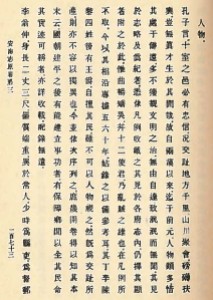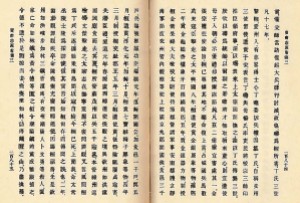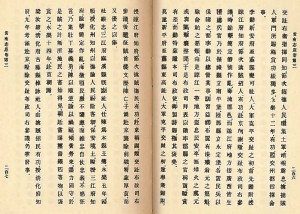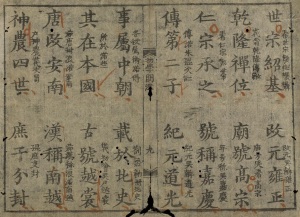The Annan zhiyuan, a fifteenth-century gazetteer of the greater Red River Delta region that Ming Dynasty officials created contains a section on “people” (人物), or what it is probably better to translate as “important people.”
What made people “important” and therefore worth recording information about in this gazetteer? They were important to the Ming officials who created this text because they were people who had attempted to govern over the greater Red River Delta region in the past and who also kept this region within the sphere of influence of northern dynasties from the Han to the Ming.
Some of the first people on the list were from the territory of northern empires, from the Han to the Tang, but others were from the greater Red River Delta region and were described in this text as either Jiaozhi/Giao Chỉ people (when the person was from the Red River Delta) or Aizhou/Ái Châu people (when the person was from an area roughly the same as what is today Thanh Hóa Province).

This section of the text begins with the following introductory comments:
“Confucius said, ‘Even in a village of only ten houses, you can still find someone who is loyal and trustworthy’ (Lunyu 論語, Gong zhi chang 公治長).This is even more the case with Jiaozhi, a land a thousand leagues away and a boundless expanse of mountains and rivers. Could it be that no true talents are born in its midst?
Indeed, from the time of the two Han dynasties to the Yuan there have been quite a few important people. Unfortunately, however, given their remoteness, they were unable to bear witness to an enlightened administration. With no means to develop their talent they fell into obscurity.”
The Ming officials who compiled this text found information about these individuals in treatises, local gazetteers as well as in “illegitimate chronicles” (偽紀 ngụy kỷ), which was presumably a reference to local dynastic chronicles.
Most of the people whom they compiled information about were administrators, but they also compiled information about people who had been meritorious in serving the Ming.

Here is a list of the people for whom this section of the Annan zhiyuan provides biographical information (names in both Vietnamese and Chinese indicate that this person was from one of the northern empires):
Lý Ông Trọng 李翁仲 (a mythical figure who was supposedly from Red River Delta but then went north to help the Qin Dynasty fight the Xiongnu)
Li Jin/ Lý Tiến 李進
Shi Xie/Sĩ Nhiếp 士燮
Du Huidu/Đỗ Tuệ Độ 杜慧度
Du Hongwen/Đỗ Hoằng Văn 杜弘文
Li Ji/Lý Tắc 李畟
Zhang Shun/Trương Thuận 張順
Zhang Boyi/Trương Bá Nghi 張伯儀
Đỗ Anh Sách 杜英策 (溪洞豪人 local chief of Khê Động/Aboriginal Settlement)
Khương Thần Dực 姜神翊 (愛州人 Aizhou/Ái Châu person)
Khương Công Phụ 姜公輔 (passed the jinshi [presented scholar] exam, also an Aizhou/Ái Châu person)
Khương Công Phục 姜公復 (Aizhou/Ái Châu person)
Ruan Yuanxi/Nguyễn Nguyên Hỉ 阮元喜
Qu Hao/Khúc Hạo 曲灝 (交趾人 Jiaozhi/Giao Chỉ person)
Jiao Gongmu/Kiểu Công Tiện 矯公羡
Ngô Quyền 吳權 (愛州人Aizhou/Ái Châu person)
Đinh Bộ Lĩnh 丁部領 (交州華閭洞人 Giao Châu Hoa Lư Động/Aboriginal Settlement person)
Lê Hoàn 黎桓 (愛州人Aizhou/Ái Châu person)
Lý Công Uẩn 李公蘊 (交州人 Jiaozhou/Giao Châu person)
Trần Thừa 陳承(交州人 Jiaozhou/Giao Châu person)
Trần Toại 陳遂 (famous as a poet)
Trần Di Ái 陳遺愛
Trần Ích Tắc 陳益稷 (submitted to the Mongols)
Trần Tú Hoàn (?) 陳秀嵈 (submitted to the Mongols)
Trần Văn Lộng 陳文弄 (submitted to the Mongols)
Trần Kiện 陳鍵 (submitted to the Mongols)
Trần Nhữ Thạch 陳汝石 (submitted to the Ming)
Trần Lễ (?) 陳豊 (submitted to the Ming)
Trần Huân 陳勛 (submitted to the Ming)
Mạc Toại 莫遂 (submitted to the Ming)
Đỗ Duy Trung 杜維忠 (submitted to the Ming)
Lương Nhữ Hốt 梁汝笏 (submitted to the Ming)

What I find interesting about the people on this list is that some of them established dynasties of their own, and under the entries for people like Lê Hoàn, Lý Công Uẩn and Trần Thừa there is information about the Lê, Lý and Trần dynasties, respectively.
Today, these dynasties are celebrated in Vietnamese history texts for being “independent” from Chinese rule, however they are all listed here in this Ming dynasty text as being “important.”
In other words the fact that a local person ruled over the region of the Red River Delta did not seem to matter to the compilers of this section of the Annan zhiyuan, and as far as I can tell, the reason why they thought this way is because the Lê, Lý and Trần dynasties had all paid tribute to whatever dynasty had been in power in the north, and in so doing, kept the greater Red River Delta region within the northern empire’s sphere of influence.
From the perspective of the compilers of this text, these dynasties were thus all important, because like the individuals who submitted to Ming rule (listed at the end of the section), these dynasties had also “rendered obedience” (效順 hiệu thuận), albeit more indirectly.

There are many ways of deciding who from the past is “important.” The local gazetteers from the greater Red River Delta region that are still extant today (like local gazetteers from the “Chinese” world) also contain biographical information about “important people” from the region. If there were any dynastic rulers who came from a region, they were listed first. After that, men who had passed the civil service exams were listed, and finally, widows who had remained chaste were noted.
There are also many ways to “organize” information from the past. There is a kind of textbook for children that was published in Vietnam in 1882 called Elementary Inquiries (初學問津 Sơ học vấn tân) which begins by teaching about “Chinese” dynasties, “Chinese” geography and “Chinese” emperors before turning to cover the same topics for “Vietnam.” Presenting this kind of information, and in this order, was very common before the twentieth century.
What does all of this teach us? It shows us that things that were important to people in the past are not necessarily the same as the things that are important to people today, and that the way that people view the world and the past does not stay the same.
To put it another way, the past doesn’t decide what is important about the past. We do, and we live in the present.
This Post Has One Comment
陳秀嵈 = Trần Tú Hoãn, chữ “嵈” đọc là “hoãn”